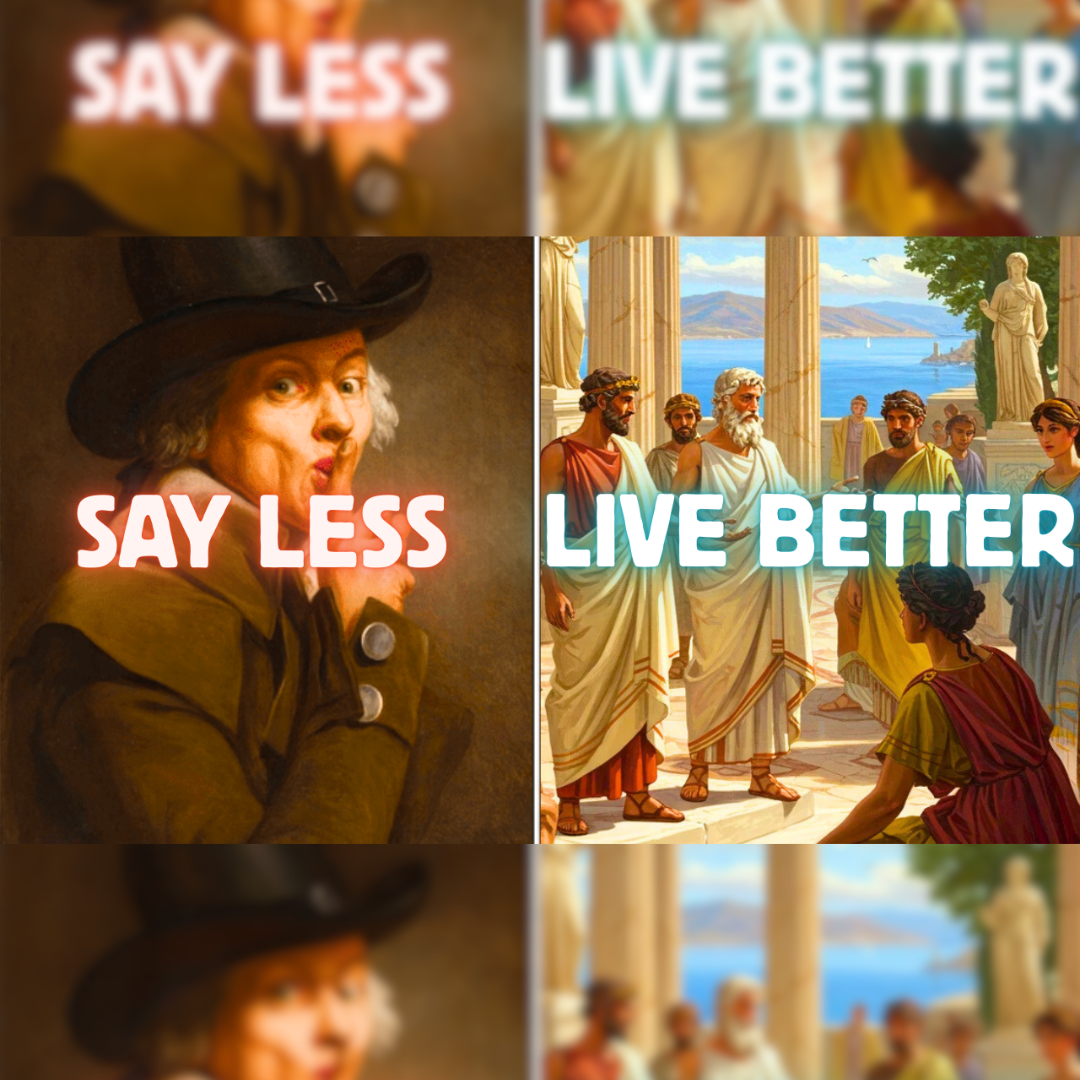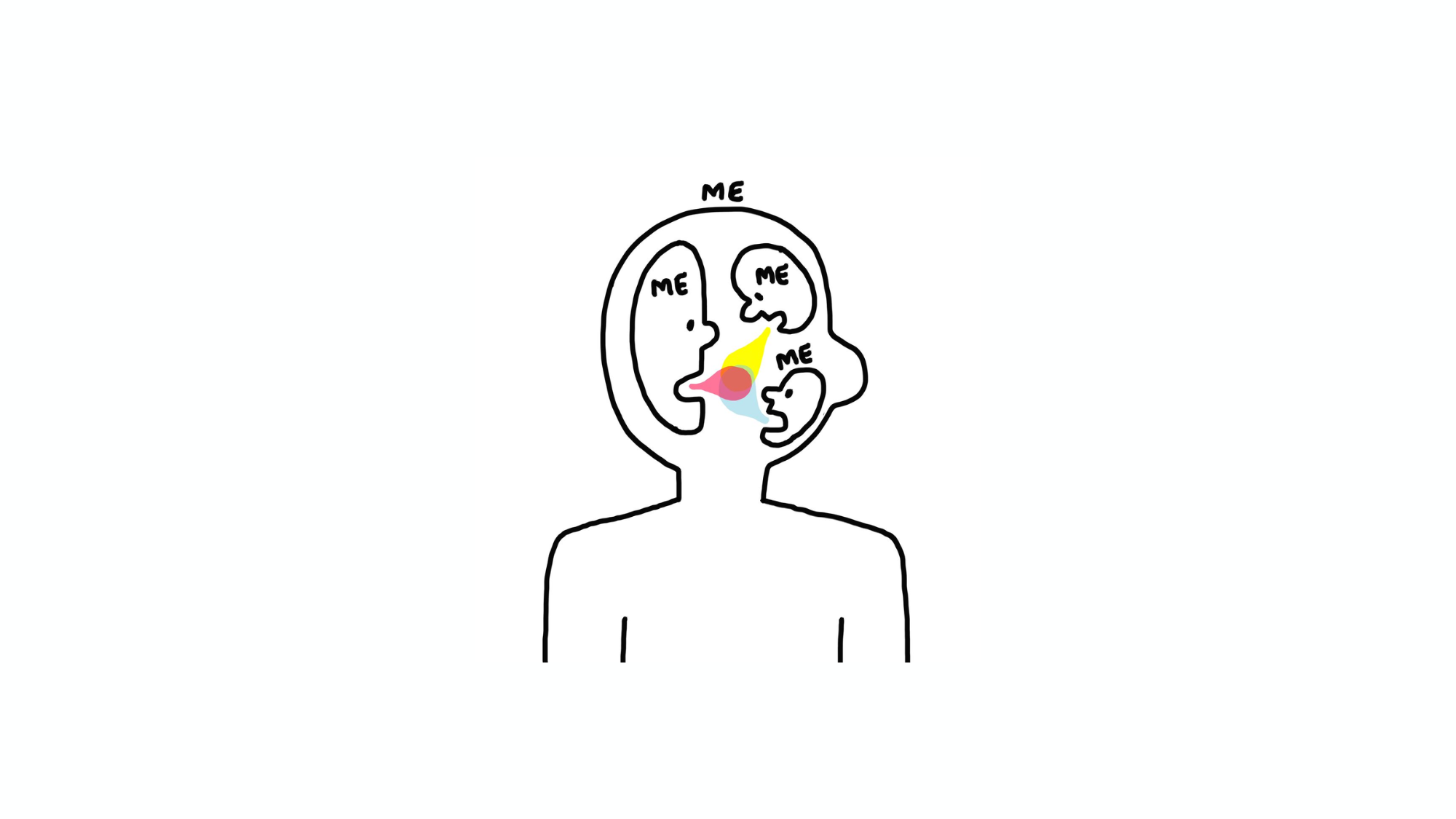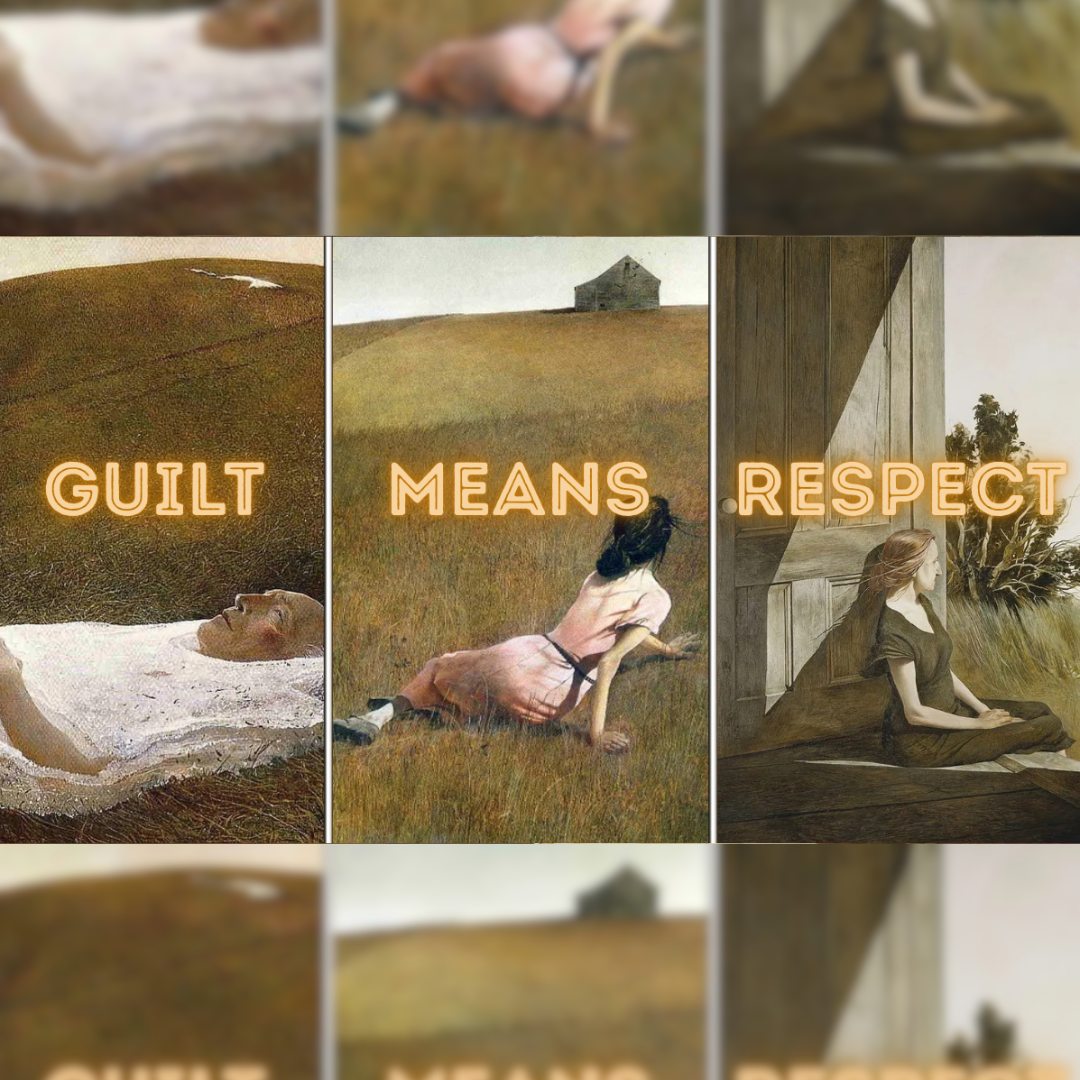

Why your bad habits keep winning (10 mins read)
Your bad habits keep winning because:
1. You're not serious about changing.
2. You're focused on effects instead of causes.
3. The cues are going over your head.
4. You're not being specific enough.
5. Your bad habits are too attractive.
6. Your bad habits are too easy.
7. Your values aren't leading your behaviours.
Instead, you're relying on willpower to defeat urges whenever they arise which is exactly why once a week you find yourself fapping, scrolling, eating junk food or smoking when you promised yourself "never again".
Started off harsh haven't we?
Yes we have.
Because this week I was in the exact same position you might be in now; fed up with continuously falling back into my bad habits and desperate to stop this cycle.
So 2 nights ago, after getting in bed at 9pm frustrated and restless because I'd spent another day scrolling, I couldn't sleep. So I stood up and did a full one hour whiteboard session, with the help of the book atomic habits, to try and figure out how to quit my bad habits. Forever.
That's when I came up with the 7 reasons why that opened this letter.
Let's unpack and reverse all of them now so you can escape bad habit hell.
WARNING: we begin with a harsh truth :).
1.) You're not serious enough.
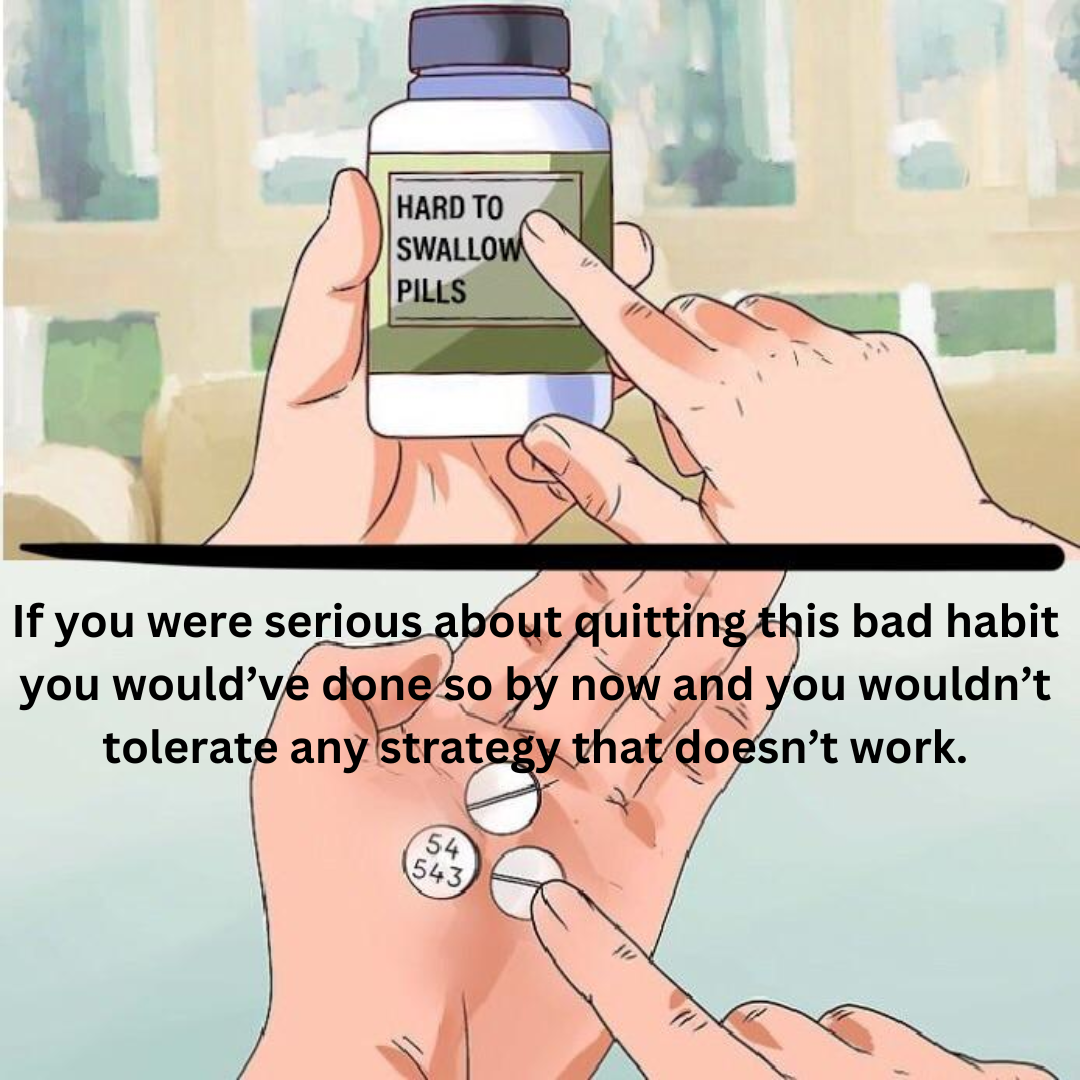
Now that feels like a slap round the face doesn't it?
Yes it does.
At least that's how it felt for me when I realised it the other night.
In the words of Kapil Gupta, Naval Ravikant's spiritual advisor...
"If you do not desire something in the depth of your bones, you will have an endless tolerance for failure. If you do desire something in the depth of your bones, you will have little tolerance for failure. And once the prescriptions fail, as they always do, you will be forced to find your own way."
"So long as unseriousness thrives, prescriptions will as well. A human who deathly desires something would never stand for a practice that continually failed to provide him that thing."
So accept that up until this point you haven't been serious and ask yourself:
- Do I actually want to change?
- Do I actually want to step into the responsibility of a new way of being?
If no, stop reading.
If yes, continue reading.
To help answer those questions, take a look at the stages of change model and try to pin where you are.
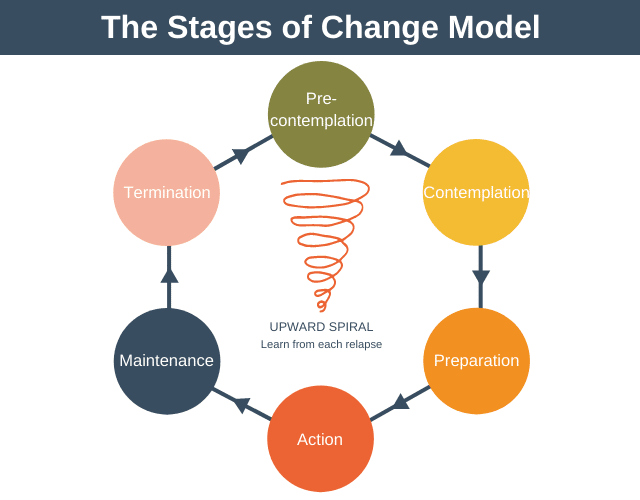
Here's another version with some dude tryna not eat junk food...
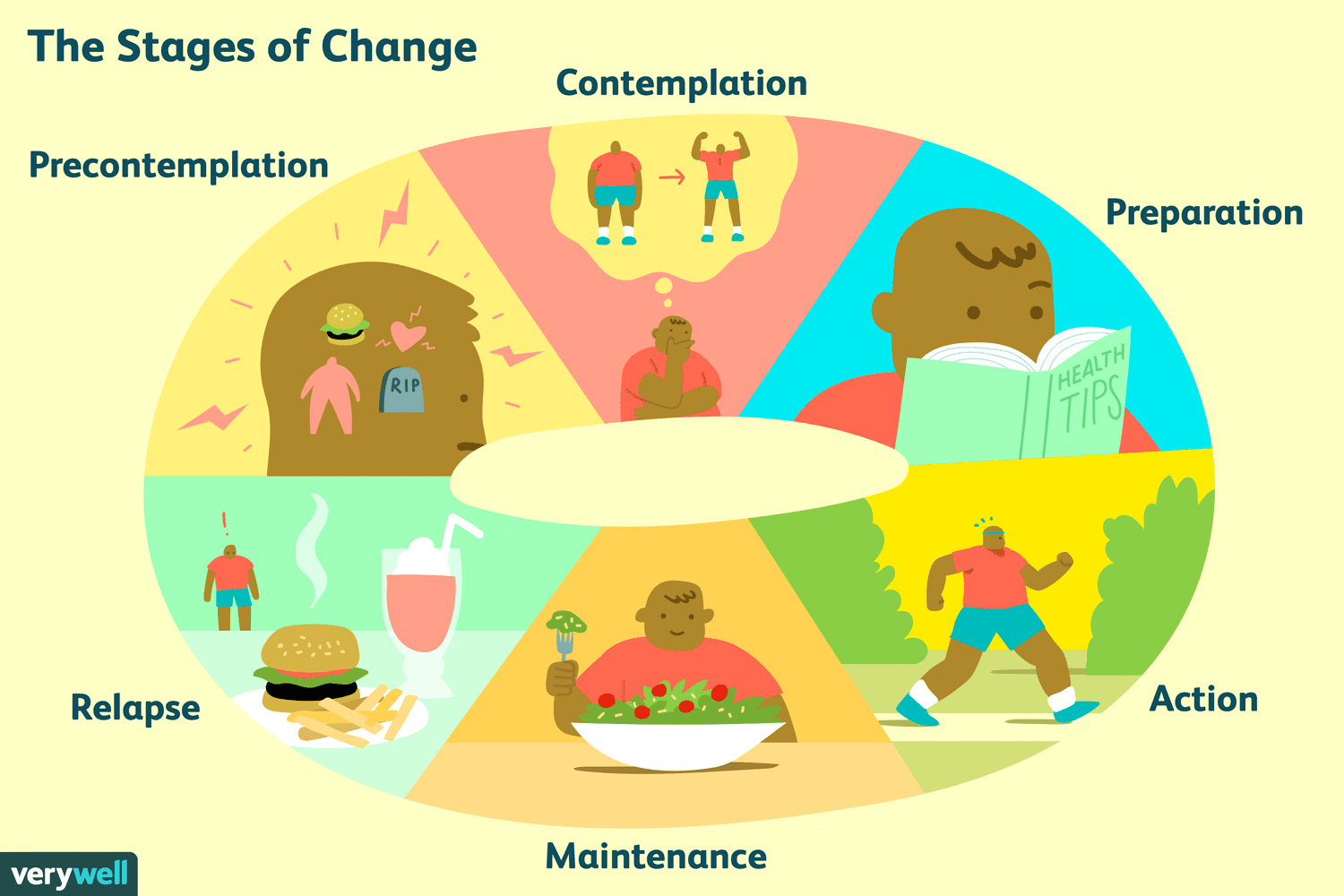
The tombstone in precontemplation got me 🤣😭.
Ok, so now you're serious, or at least a bit more than you were before reading this letter, what's the second thing causing your bad habits to keep winning?
2.) You're focused on effects instead of causes.
"Society constantly expends its efforts to correct effects instead of causes, which is one reason why the evolution of human consciousness proceeds so slowly." - David R. Hawkins, Power vs. Force: The Hidden Determinants of Human Behavior
If you've read or watched other content about this topic before, this will sound familiar but its worth mentioning a billion times until you understand it.
Your bad habits are not the problem. They are simply your attempts to meet an underlying need of yours. And until you find a better way to meet that need, your bad habits will continue to serve you.
In other words, your brain didn't evolve to smoke, watch porn, eat junk food or scroll social media. It evolved to; relieve stress, connect with other humans, satiate and rest.
So you can run around like a headless chicken all you want trying to "quit" your bad habits with accountability partners, app blockers and time restrictions but if you don't solve the underlying problem (the unmet need your bad habits are trying to meet) then you're going to continue to do the bad habit.
Let me be annoying and repeat that.
If you don't meet the underlying need this bad habit is trying to serve in another way, you're going to continue to do the bad habit.
But in order to figure out what the unmet need is, you have to highlight all the cues triggering this behaviour in the first place.
Which highlights the third reason why your bad habits still exist...
3.) The cues are going over your head.
A cue is something you see or feel which causes you to act.
They're the catalysts for habits to form, with the 4 steps of habit formation being:
- Cue
- Craving
- Response
- Reward
Cues (also called "triggers" in the words of author Nir Eyal in his book indistractable) can be internal or external.
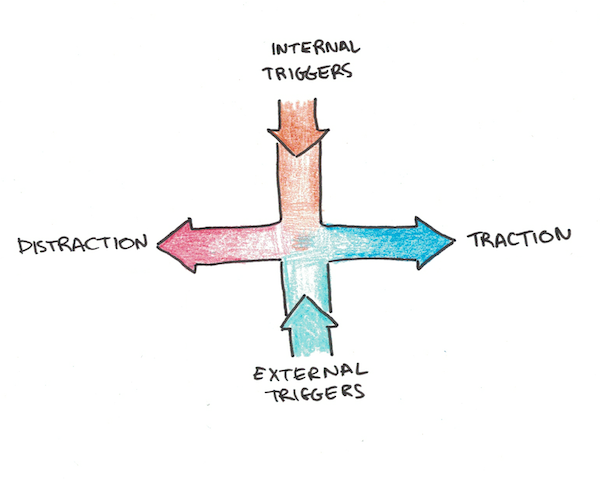
For example, an external cue/trigger would be:
- Cue = I see my phone.
- Craving = I think of youtube videos.
- Response = I open youtube.
- Reward = dopamine hit.
So as long as I keep my phone out visible, I'll continue to perform the craving behaviour.
An internal cue/trigger would be:
- Cue = I feel bored.
- Craving = I want to escape boredom.
- Response = I grab my phone and open youtube.
- Reward = my boredom is gone (temporarily lol).
So the bottom line and key point of this whole letter is...
In order to quit your bad habits you need to:
1. Become crystal clear of all of your external and internal triggers.
2. Get rid of your external triggers as best as you can.
3. Highlight exactly what need your internal triggers want you to fulfil.
4. Outline exactly how you're going to respond to that trigger in a new, healthier way.
Good news!
These steps only take around 5 minutes to do.
Here's what you do...
Get a pen and paper and make the following table (note: the one below will be filled in based on my answers so get ready for an insight into my mind *gulp)...
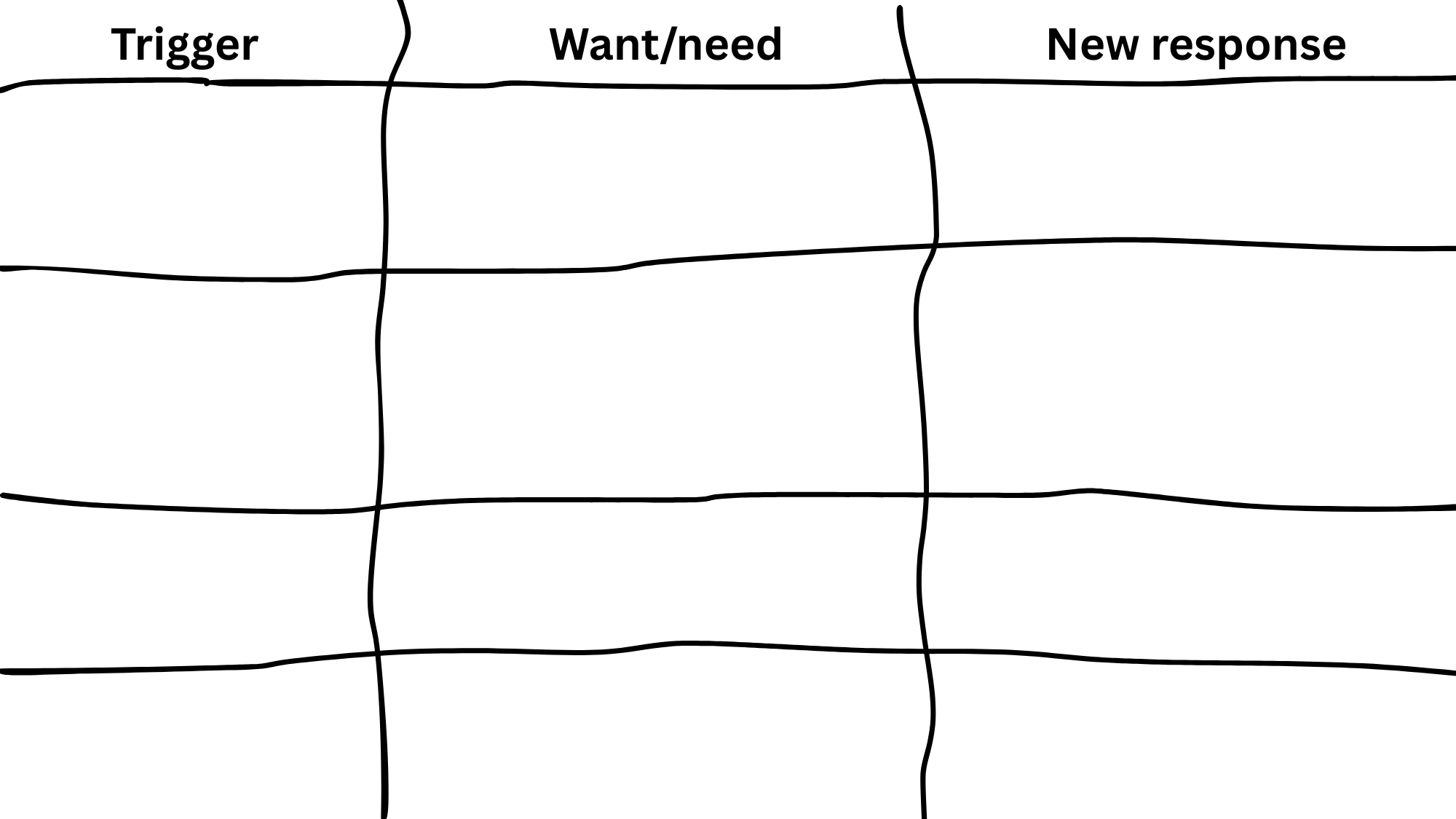
1.) In the first column write down all the internal triggers you think are causing you to do this bad habit.
Think back on previous relapses and consider what happened before you relapsed.
- What did you want?
- What did you need?
- What uncomfortable feeling was you trying to avoid?
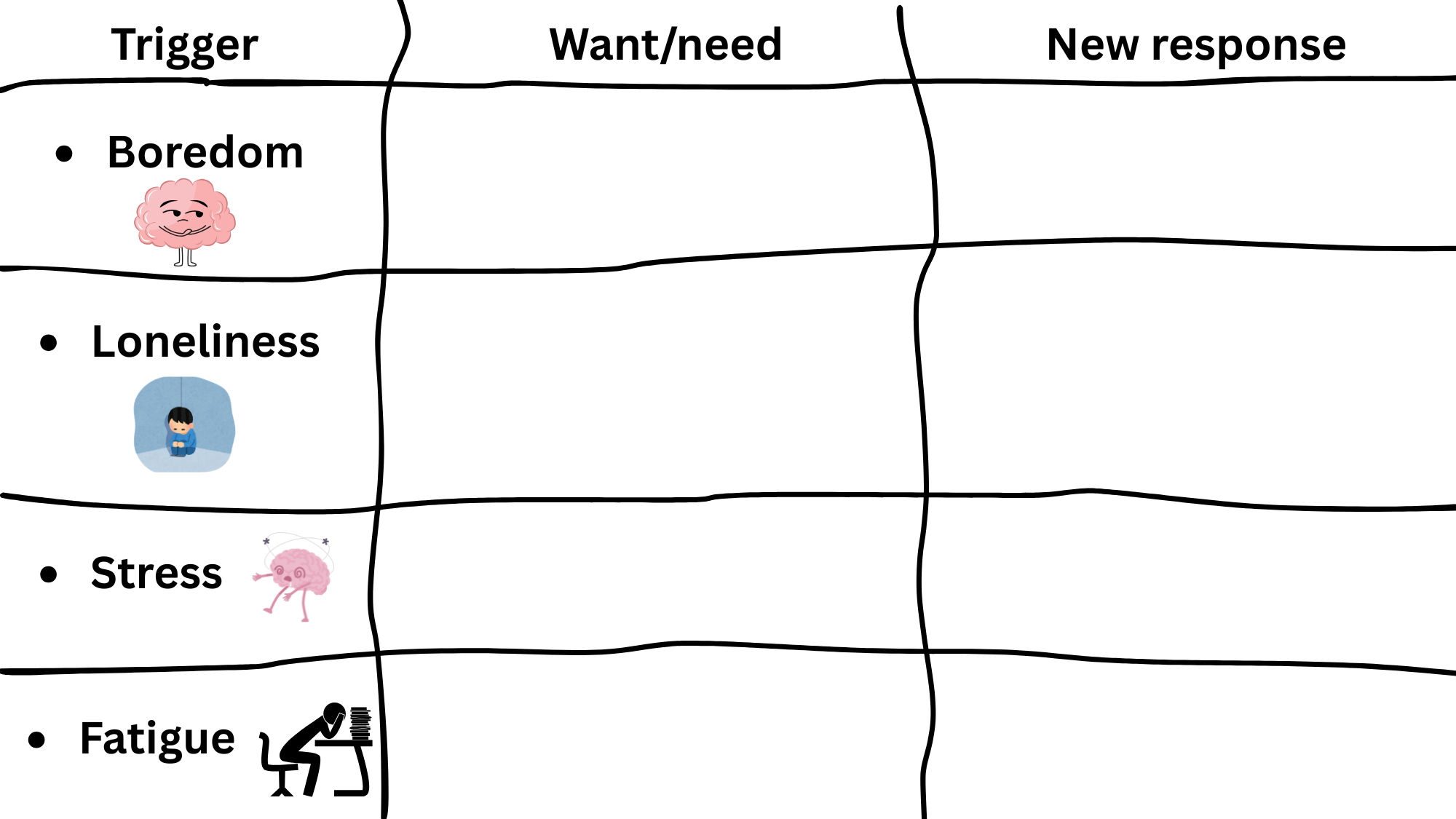
Note: I guarantee your triggers will be similar to the column above. But it's still worth asking the above questions just in case there's any others.
2.) Now you've highlighted the internal triggers, in the middle column try and uncover what that trigger wants you to do.
Think about this logically:
- Why would you feel bored? Lonely? Stressed? Fatigued?
- What type of action would that trigger want you to perform next?
- If you could speak to this trigger, what might it want you to do?
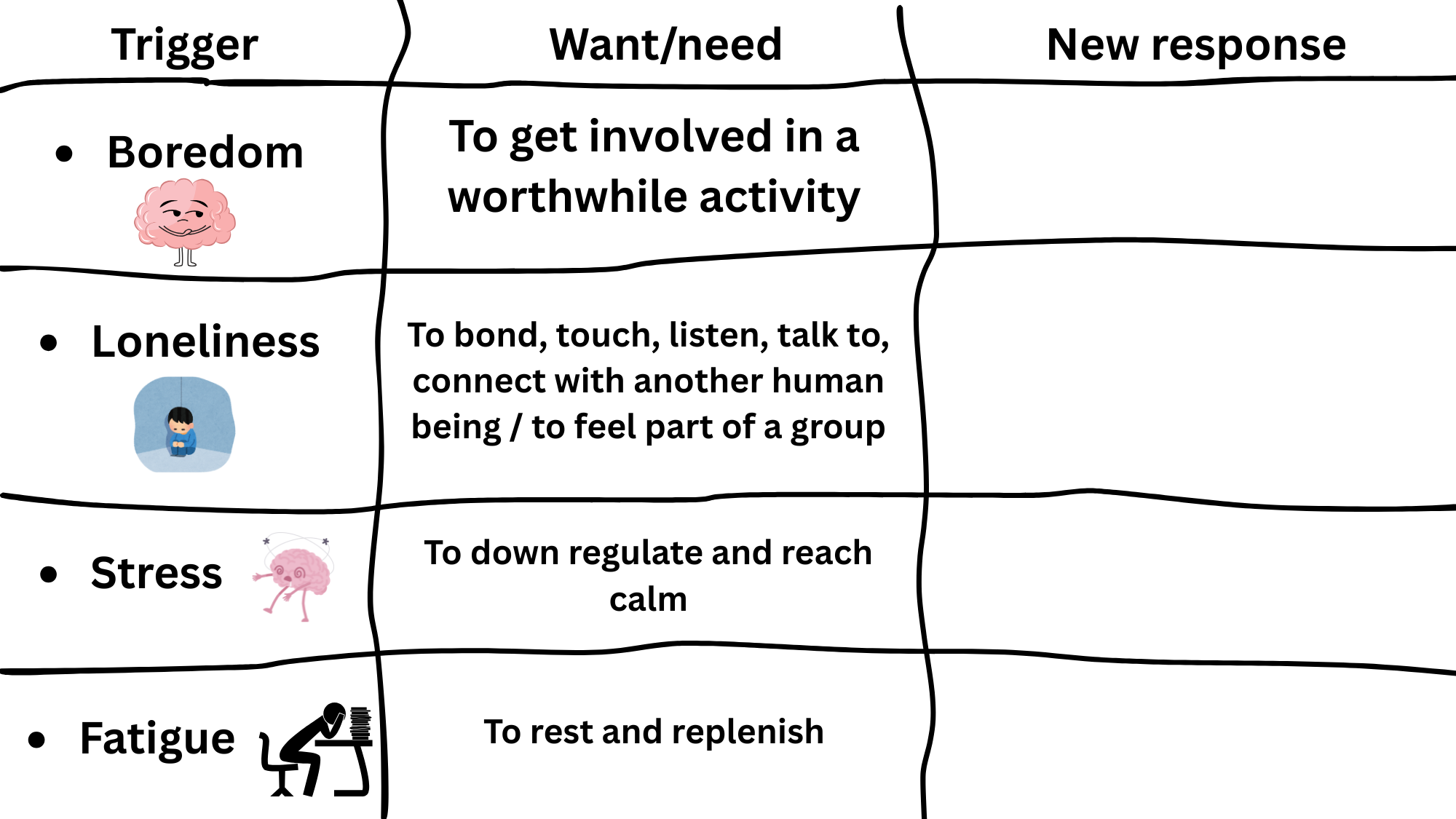
Why is this important?
Your triggers aren't the bad guys.
I know it seems like they are and throughout this letter we've been using terms such as "beat your bad habits" or "why your bad habits keep winning" as if its some grand battle you have to fight.
But its not a battle.
You're a human being with needs to fulfil and your triggers are simply awakening you to those needs. That's all.
Of course the ways you've been meeting those needs haven't been serving you in the long run, so this is all we're focused on changing now; how can we meet these needs in a way that serves you now and later. Rather than a way that numbs you now and depletes you later
3.) Finally, in the third column strategise new ways to respond to this trigger to meet its need with a healthier response.
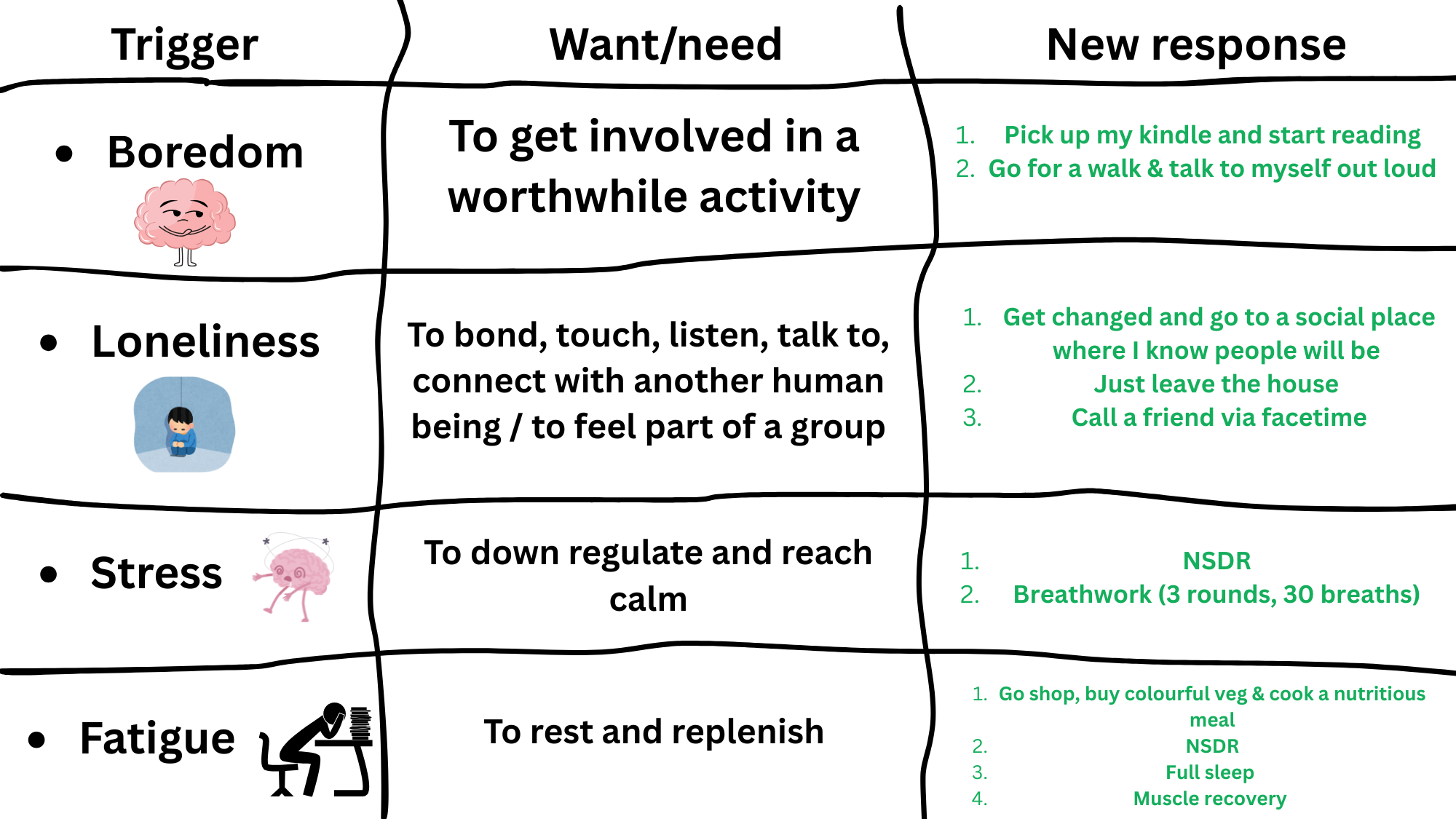
Note: in my column NSDR means non sleep deep rest (its basically a nap for 20 minutes). It's honestly amazing and I've been doing it every day around 5pm.
But before you go ahead and fill your third column, there's one thing you need to do which'll make or break your progress...
You need to write a specific cue-response sentence that'll help you turn the new response into a clear habit.
Which highlights the 4th reason why your bad habits keep winning.
4.) You're not being specific enough.
Did you notice that some of the new responses I put in my third column weren't specific enough?
For example:
- Just leave the house
- NSDR
- Breathwork
New responses like these are great but they'll fail you when the moment of impulse comes simply because they're not specific enough.
So now with the understanding of your triggers, write down a sentence on a flashcard like this...
"When I feel (trigger), I will go to (place) and I will (new behaviour)."
For example:
- When I feel lonely, I will go into my room, change my clothes and go to the costa coffee around the corner and order a drink. ✅
- When I feel bored, I will go to my bookshelf, get my kindle, lay down on the floor and read and new/current book. ✅
- When I feel stressed, I will stop what I'm doing, go to my bedroom floor and do 3 rounds of breathwork. ✅
- When I feel tired I will stop what I'm doing and take a 20 minute NSDR on the sofa. Then I'll cook a colourful nutritious meal in my kitchen. ✅
When, where, what, how.
Now put those sentences in your third column.
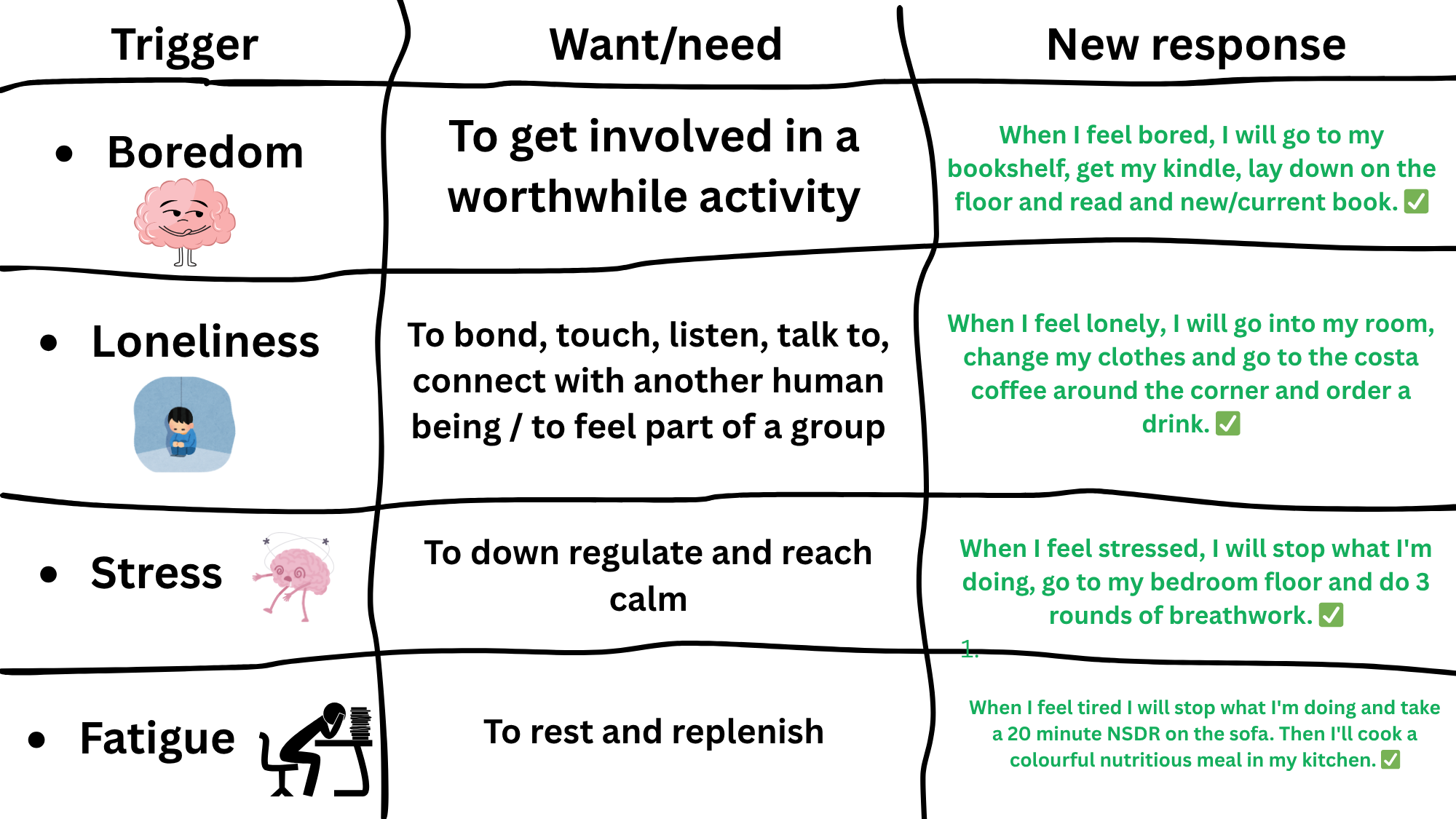
Now let's finalise with the final 3 reasons why your bad habits keep winning...
5.) Your bad habits are too attractive.
So make them unattractive.
Here's how you do so:
1. Think of the bad habits you'd like to change and write them down on a flashcard.
2. Then write down every bad thing this bad habit is doing to you and will continue to do to you if you keep doing it.
For example, my 2 bad habits were scrolling youtube and watching porn. Here's what I wrote down to make them unattractive.
🔻 YouTube Scrolling (Mindless Consumption).
"Every time I fall into scrolling, I am handing over my mind to an algorithm that thrives on distraction and despair.
It pulls me into a world designed to manipulate my attention, stir envy, ignite cravings, and crush my sense of peace. I come out foggy, irritable, ashamed — like I’ve betrayed myself.
It rewires my brain to crave constant stimulation and leaves me numb to the beauty of real life.
It kills my momentum, drains my energy, and replaces meaningful action with passive addiction.
I end up hating myself for wasting time I can never get back.
This is mental junk food for a starving soul.
I deserve better — and there are better ways to meet this need for relief, meaning, and connection."
🔻 Porn
"Every time I give in to porn, I am flooding my brain with artificial stimulation that hijacks my dopamine, kills my motivation, and twists my sense of intimacy.
I’m training myself to see women as objects, not as partners.
I am eroding my ability to feel real love, real arousal, and real connection with the woman I will one day call my wife.
And worse — I feel it in my bones after. The shame. The social anxiety. The hollowed-out energy. The loss of integrity.
This habit is weakening me — stealing my fire, my presence, my confidence.
It’s a hit of pleasure that leaves behind a trail of self-disgust.
Every time I indulge, I reinforce the very habit I’ve been fighting to break.
This is not pleasure. This is self-sabotage disguised as relief.
There are far more powerful, life-affirming ways to meet the need for touch, release, and connection."
Then on the back of the flashcard write down the new ways you want to respond to the underlying internal trigger (as we covered in the last point).
Read the cards every morning and in every moment of temptation.
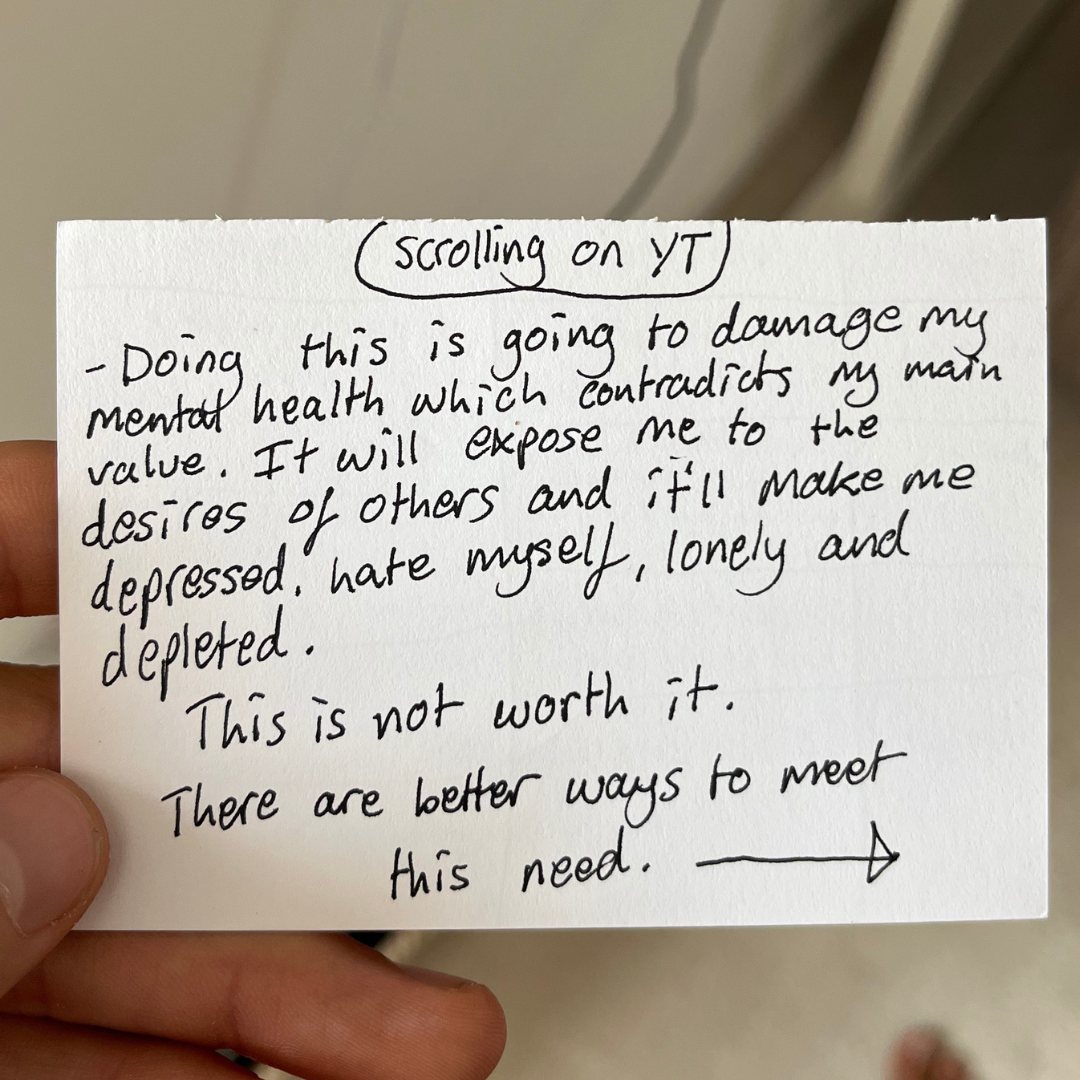
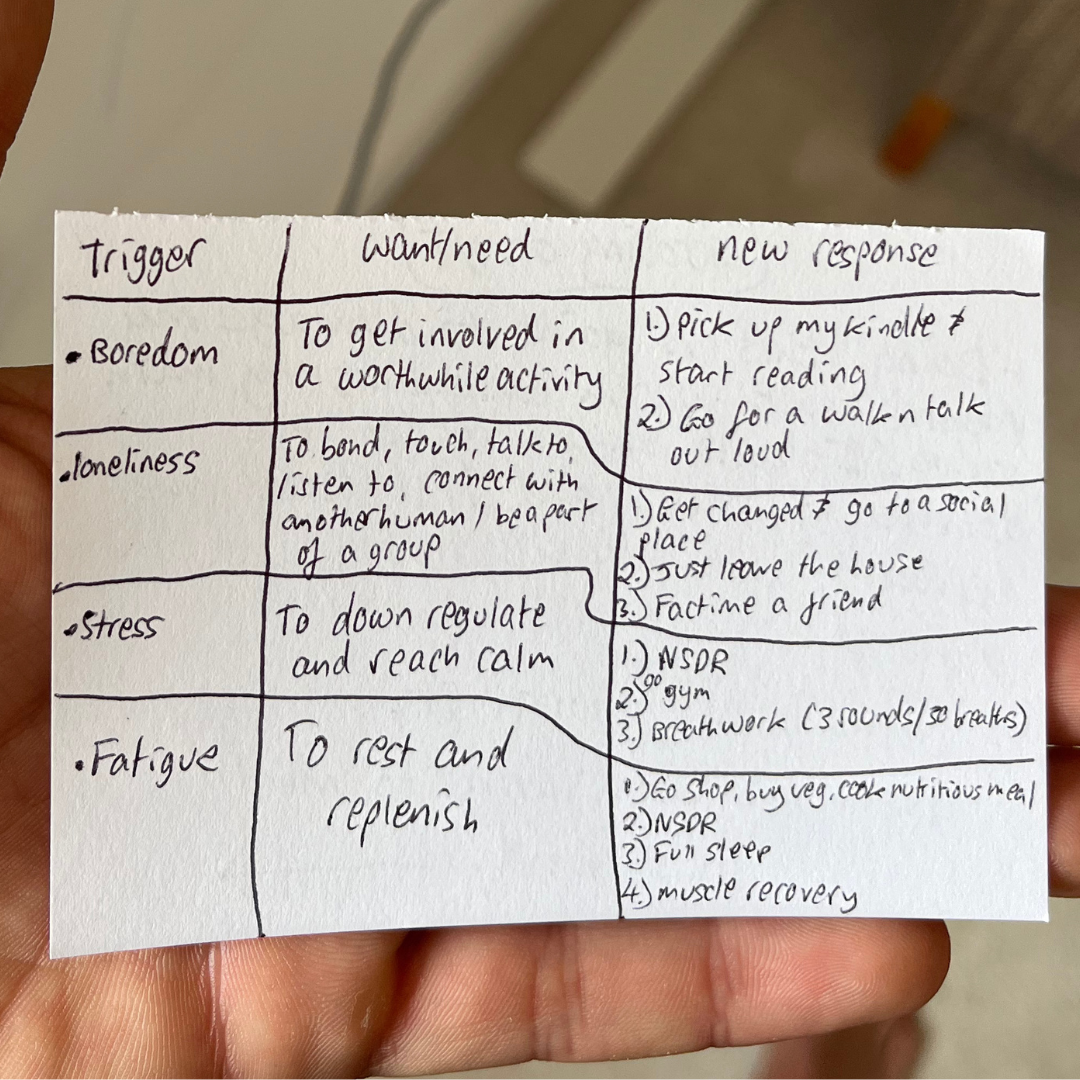
(Lol my bad I've just realised my column 3 is not specific enough. I'll rewrite the flashcard after I send this).
Note: mindfulness based therapy is a great way to battle addictions and bad habits, but not in the way you think. It doesn't just involve meditating but actually paying attention to the action the next time you do the bad habit. For example, the next time you scroll, take a moment to really think about what you're looking at, how you feel, what your posture is doing. The next time you eat junk food really try and savour the taste, smell and experience of what you're eating. 9 times out of 10 you'll realise you don't actually like doing the thing anyway.
6.) Your bad habits are too easy.
I only talk crap about the strategies of time blockers, app restrictions and accountability partners if you rely on them before you strive to meet the unmet need of yours.
But they're incredibly helpful when you finally start meeting that need with your new response simply because putting as much friction between you and the bad habit as possible will make you less likely to do it.
Delete apps, block them completely, get rid of your phone, stop buying junk food, block all adult websites, throw all your drugs, alcohol, cigarettes in the bin.
This is how you deal with external cues to your bad habits; you get rid of them or make their presence near enough non-existent.
Mindset shift: look around your room/living space right now. Look at everything as a call for your attention. A call for you to perform a particular behaviour. Are those behaviours serving you or not? The people you consider "disciplined" don't have unlimited sources of willpower unlike you. They just organise their environment so doing the value-driven activities are easier than any bad habit.
Speaking of value-driven activities...
7.) Your values aren't leading your behaviour.
In 2018 I stopped watching porn completely.
But 3 years later the habit crept back in when I found myself under stress and just wanting to distract myself from life.
So in a drastic attempt to quit this bad habit again, I tried to do everything I did before to quit it. But nothing worked.
Mainly because what helped me quit in 2018 was travelling the world and keeping myself busy. But in 2022 I found myself alone, isolated and stuck in the same place.
I had to find I new way to quit. I had to go inwards.
So one day, after being feeling up and frustrated that I'd fallen back into the same bad habits again, I went on a bike ride to clear my head and began speaking to myself out loud.
30 minutes into that bike ride I realised; watching porn violently contradicts my values.
The values of; mental health, discipline, love and connection.
And then it clicked.
I don't have to continue engaging in something that contradicts my values.
HOW DID I NOT REALISE THIS BEFORE?!
Suddenly I wasn't being unconsciously dragged into the bad habit but meaningfully pulled away from it by my values.
I also had the same realisation the other night stood in front of the whiteboard.
Walking around the room, scratching my head I said to myself "right, let's actually get clear on what my main value is". So I thought for a bit and realised; my main value is flourishing mental health.
Huh.
Then I realised scrolling youtube and pmo'ing are directly violating that value.
And I don't want to live out of line with my values.
Problem solved.
The bottom line...
When you violate one of your values, you feel bad. Whether its guilt, frustration or annoyance, the bad feeling is telling you "hey man, this isn't within your moral code, don't do that again otherwise you'll feel worse."
So if you aren't clear on what your values are, how are you going to know you've violated them?
The answer: you won't.
That's the trick keeping you doomed to repeat your bad habits; by not knowing your values, you won't feel bad when you transgress them which means you'll justify doing your bad habits.
- "Meh, scrolling isn't so bad."
- "You know what, porn isn't as bad as what everyone says."
- "Junk food is actually ok."
Whereas when you're clear on your values you understand exactly what behaviours uphold them and which ones violate them.
So to summarise point number 5,6 and 7 in one question:
How can I make the value lead activities easier and more attractive while making the draining and shallow activities harder and less attractive?
And good news: living in line with your values is your only task for the rest of your life. Live in line with them and that'll be a life well lived. What's the meaning of life? What does success actually mean? = solved. Just live in line with your values.
Figuring out what your values are can take seconds:
1. What words/things/ideas stick out as most important to you?
2. Write down a list of them and then rank them in terms of importance (yes you need to rank your values, they can't all be as important as each other otherwise when you're making decisions you'll be screwed).
For example, the other night my list looked like:
- Discipline
- Mental health
- Connection
- Love
- Vulnerability
- Playfulness
- Courage
- Curiosity
- Stillness
- Clear thinking
Ranking:
1.) Flourishing mental health
(I realised all the other values are a consequence of this one).
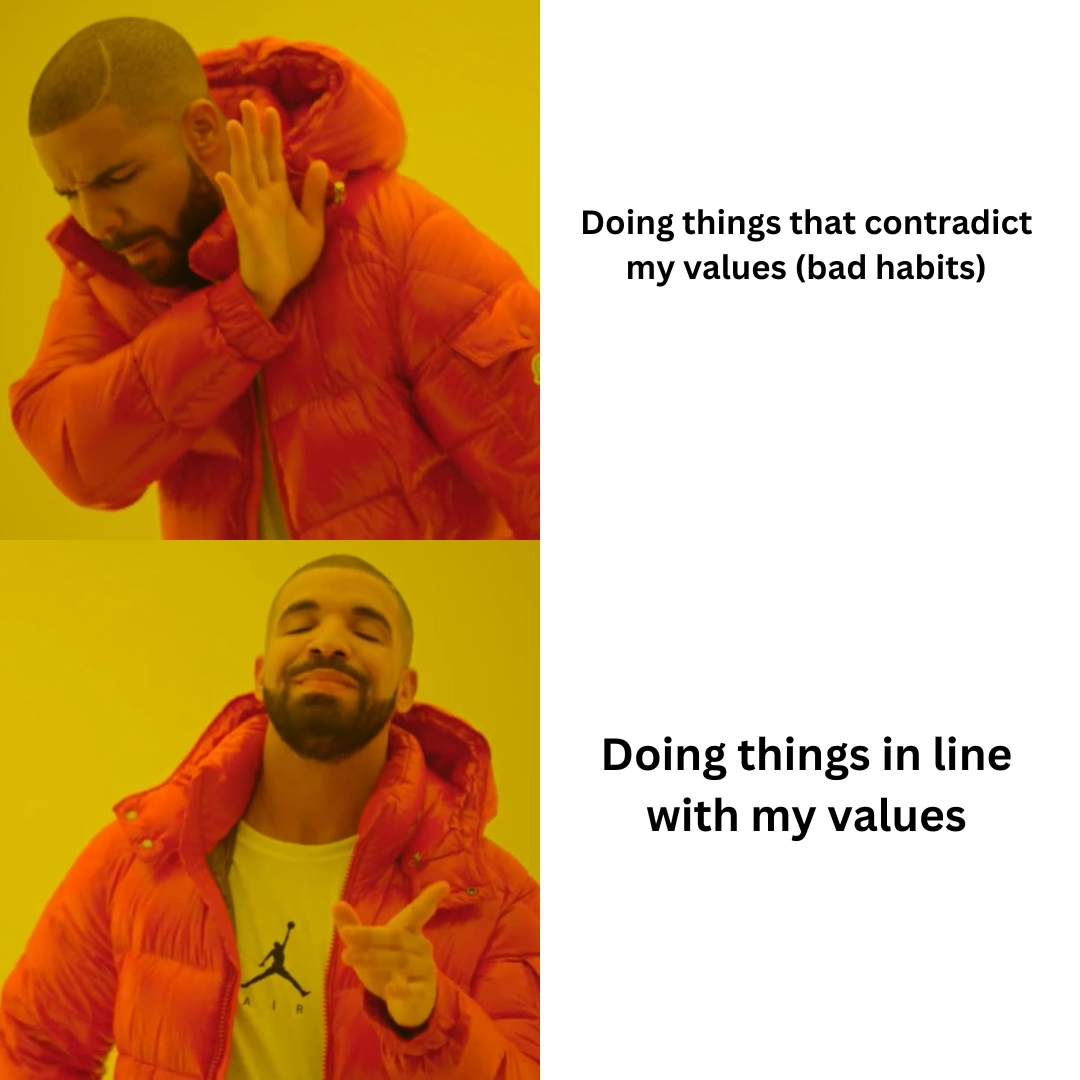
In summary, the 7 reasons why your bad habits keep winning are:
1. You're not serious enough about changing.
2. You're focused on effects instead of causes.
3. The cues are going over your head.
4. You're not being specific enough.
5. Your bad habits are too attractive.
6. Your bad habits are too easy.
7. Your values aren't leading your behaviours.
That's all for now.
I'll be making a vid on this soon so I'll fill in any gaps.
Now let's finalise with all your brilliant ideas for the new name of this newsletter:
- One small win (Sagar)
- Mental health minute (MR)
- "Amigos and Amigas, here's your weekly dose of Mentalphetamine." (Hassan)
- Eudaimonia Express (Miguel)
- Cogito Thursdays (Miguel)
- Thursday’s Therapy (Miguel)
- Thoughtful Thursday or Thriving Thursday (Gisela)
- Lew’s letter (Robert)
I still have no idea which one to pick 🤣 but thank you all for the suggestions. I'll have a further think over the next few weeks. Let me know which ones you like or if you have any other ideas.
Thanks for reading.
Until next week,
Lew
P.s. mental reprogramming section of the social anxiety programme done. I was also organising the "how to master small talk" section today and it's simple but my gosh is it effective. Get ready to rizz/chat up/talk to anyone in any queue anywhere. (And cafe, party, bus stop, street, corridor etc. lol).
tHURSDAY'S THERAPY
Join 10,000+ improving their mental health & social skills 1 Thursday newsletter at a time
Happy to have you here!
try refreshing the page and trying again!




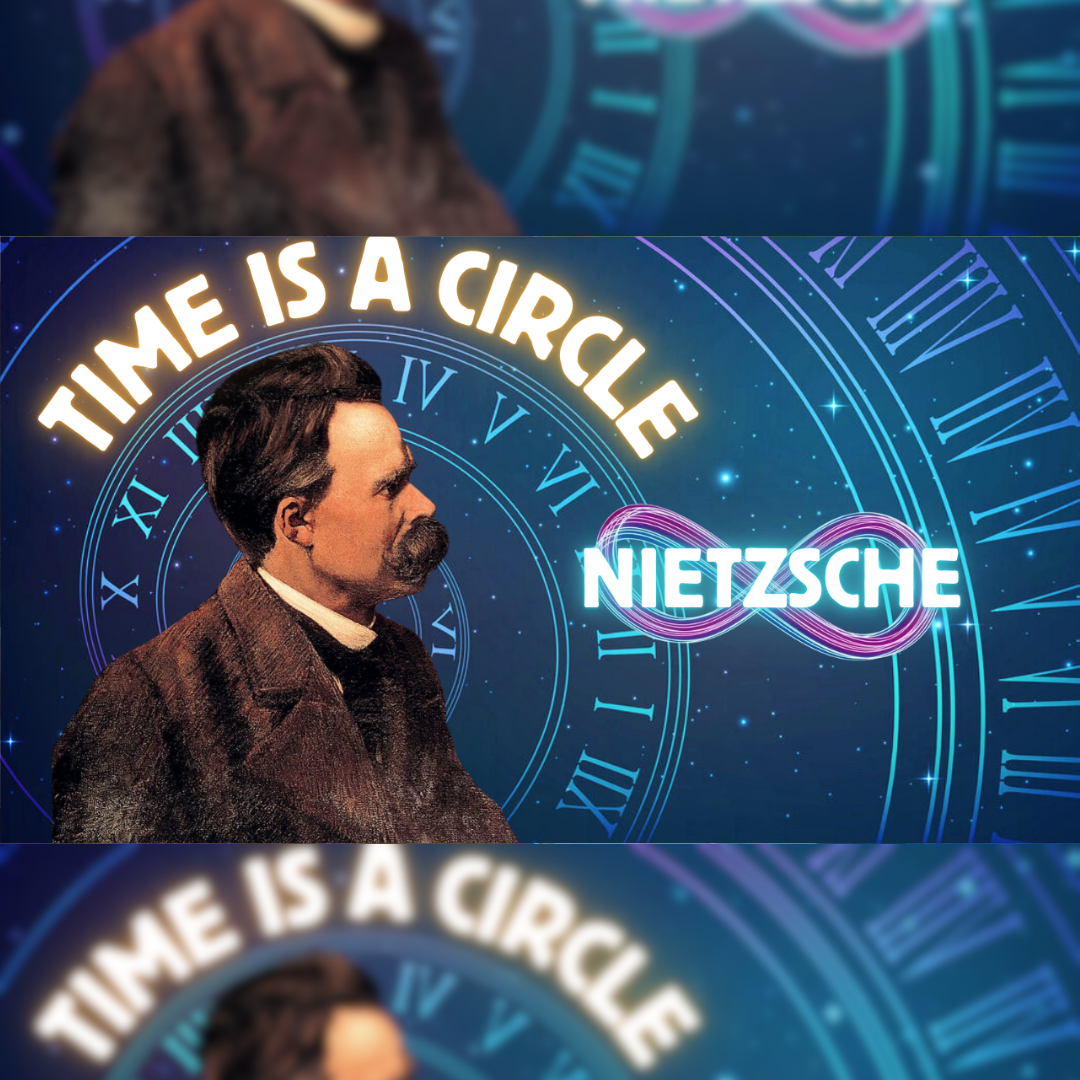
.png)

.png)
